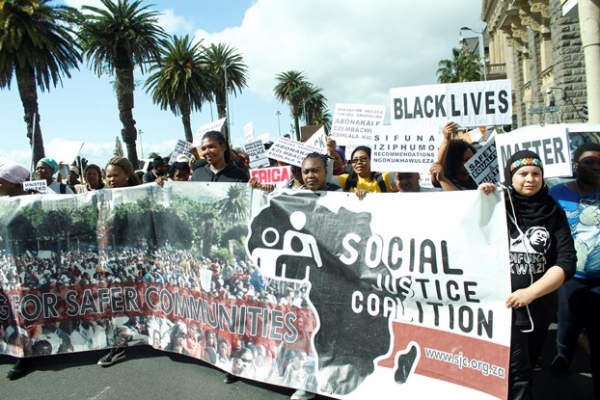

About 200 people marched in the city centre on Tuesday in support of demands for better policing in Khayelitsha. Picture by Masixole Feni.
25 August 2015
Around 200 people from several social justice organisations took part in a march to parliament on Tuesday, for safety, equality and justice.
The march, organised by the Social Justice Coalition (SJC), Ndifuna Ukwazi(NU) and Equal Education, was in support of the demand for a fair share of quality South African Police Service resources in Khayelitsha.
Chanting struggle songs while marching from Keizersgracht, the protesters carried banners demanding safer communities and posters with the huge words “Black Lives Matter”.
The march came exactly one year after the release of the report of the Khayelitsha Commission of Inquiry report, which highlighted grave problems with policing in Khayelitsha. National police commissioner, Riah Phiyega, has denied, disputed or redirected to the Western Cape Provincial Government and City of Cape Town every recommendation of the commission.
The SJC’s general secretary, Phumeza Mlungwana, said on Tuesday that Minister of Police Nathi Nhleko and Phiyega needed to realise that there were human beings living in Khayelitsha and they would not be ignored.
“We won’t allow them to ignore us. We are tired of meeting after meeting and emails back and forth. We are not marching today because it’s fun and we want to. We are marching because we have to. They must understand that this is not about politics, this is about our safety. Our grandmothers, our mothers, our children are at risk. Our men and brothers are being killed in vigilante attacks.”
“Day in and day out you hear of a rape. Police need to do their jobs. We will not be silent on crime, we are tired and we need answers,” said Mlungwana.
Khayelitsha residents delivered a memorandum yesterday to the office of Police Minister Nathi Nhleko, demanding a better share of police resources. Picture by Masixole Feni.
Marchers included members of Right2Know (R2K), Grandmothers Against Poverty and AIDS, Treatment Action Campaign, Sonke Gender Justice, church organisations and the United Front.
The NU’s Zackie Achmat said there were 600 rapes reported every year in Khayelitsha and a backlog of thousands of cases. He said the problem was not just that more police officers were needed in Khayelitsha, but that trained, competent and experienced police officers were needed.
“ We are giving the minister one month to respond, or we are going to court”.
The march organisers said Harare police station in Khayelitsha had recorded the second highest number of murders in the country in 2013-14, but had the lowest number of police per head of population in the Western Cape. In the 10 safest parts of Cape Town there was one police officer for every 178 people, while in the 10 least safe parts of the city there was one police officer for every 1,043 people. The memorandum, accepted by Molate Moremi, stakeholder relations manager in Nhleko’s office, highlighted the situation in Khayelitsha with the story of Makhaza resident Vuyiswa Mpekweni, whose niece and three children were gruesomely murdered in their shack in 2007. The perpetrator handed himself in at Harare police station, but he was released because of a mislaid docket. He was eventually arrested and sentenced to 30 years in prison in March this year, after Mpekweni’s testimony to the Commission.
The memorandum also requested responses to the recommendations of the Commission of Inquiry, highlighting the need for police resources in black and coloured communities and calling for visible policing. Demands included a commitment to finalise and implement a national policy on vigilantism within two months of receiving the memorandum; a plan by the Western Cape Education Department and the City of Cape Town to address the safety of learners; and a plan for a rational and equitable redistribution of resources in all nine provinces.
Fourteen members of the different organisations planned to sleep outside parliament for the next three days as they waited for a response from the minister.
Meanwhile, in a meeting on Monday 24 August, the Western Cape Government and the SAPS undertook to establish a joint task team which would work through the Commission’s report and recommendations, with a view to implementation. The team is to comprise five representatives each from the Western Cape Government and the SAPS, and is set to have its first meeting in the next 14 days. The team will report directly to the Premier Helen Zille and National Commissioner on a regular basis.
The SJC’s Chumile Sali told GroundUp that the establishment of this team was long overdue, a year after the report had been released.
“We welcome the progress but we are still not convinced that Riah Phiyega and Zille are committed to implementing the recommendations. On 6 June Phiyega released a report rubbishing almost all of the recommendations, why is there a change of heart now? I think that this is due to the fact that we threatened to take legal action against the ministry of police. So we are not convinced, which is why we are here today. We want the minister to respond himself because we understand that Phiyega is on her way out, so we don’t take anything that she says seriously. We will give the task team a month to see the work that will be done.”
Khayelitsha residents marched on Tuesday to demand the implementation of the recommendations of the Khayelitsha Commission of Inquiry, published a year ago. Picture by Masixole Feni.